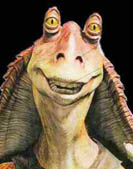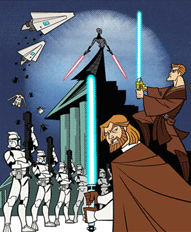May 2, 2005
Feature
Television: A New Hope?
Clone Wars and the Future of Star Wars on Television
 |
Since the very beginning, a huge part of the Star Wars phenomenon has been what's known in the fan community as the "Expanded Universe," ostensibly a vast and ever-growing collection of officially-licensed novels, comic books, video games, action figures, and even television series or specials that all take place within the Star Wars universe but which follow different events (and sometimes characters) than the ones covered within the theatrical films themselves. As you can imagine, these forays into what usually amounts to Lucasfilm-sanctioned fanfic can vary wildly in quality, but occasionally one will come close to reaching that high water mark I mentioned before. Might the largely unexplored depths of the Expanded Universe be the place for disenfranchised Star Wars devotees to cast their remaining hopes for the series? I'd bet the Millennium Falcon on it. And while the first four categories of Expanded Universe media I listed above have certainly held the attention of the more hardcore followers of Star Wars for the past twenty-eight years, the last one has an undeniably farther-reaching grasp on the general public: television. And while the few early experiments in bringing Star Wars to the small screen were not all categorical successes (see the unintentionally hilarious Star Wars Holiday Special from 1978), there have been some exceptions that are still treasured by fans to this day, including both the short-lived Droids and Ewoks animated series and two made-for-TV Ewok movies, all from the mid-eighties. From that point on, however, finding original Star Wars content on the tube has been a nearly impossible task. That is, until about a year and a half ago.
"General Kenobi, years ago you served my father in the Clone Wars." That's all there was: just one line from the original Star Wars film, spoken by Princess Leia via pre-recorded hologram. That's all fans had to go on for the twenty-five years spanning the release dates of Episodes IV and II, but it was enough. Based on that one line, we knew the Clone Wars had to be big, they had to kick ass, and they had to somehow involve clones. And we knew they would show up in those mythical "prequels" that took ever so long to materialize. And then, of course, Attack of the Clones came along and most of us were disappointed once again. Apparently Lucas had now decided not to actually show the Clone Wars in the films themselves, but to have them take place in the period between Episodes II and III. And once again, a lot of Star Wars fans felt like they had gotten the shaft. Thankfully, there was some measure of appeasement in the works. And as a result, the end product may come closer to resembling the image of the Clone Wars that fans had been imagining all along than if they had been left in Lucas's hands.
 |
Clone Wars picks up right after Episode II left off, with the separatist droid armies on the defensive from the newly-created clone army of the Republic. And right off the bat, the emphasis here is on action. Lots of it. Tartakovsky has streamlined Star Wars down to its bare essentials, eliminating most of the dialogue and focusing in on the sheer awe of cartoon Jedi partaking in epic battles pseudo-anime style. Some potential viewers may be hesitant to give the show a chance because it features most of the characters introduced in the first two prequel films in prominent roles. But I'll tell you something that should immediately lower your defenses: there's nary a Gungan to be found. That's right, not even He Whose Name We Shall Not Speak bothers to make an appearance throughout the entire twenty-five episode run. And if that doesn't entice you to check out some episodes at The Official Site then I don't know what will. Perhaps you'll just have to take my word for it and trust me that it's worth it just to see Mace Windu get medieval on a buttload of Battle Droids.
Despite the fact that Clone Wars is light on dialogue, Tartakovsky and his staff have done a bang-up job at nailing the characterizations of the ensemble and much of the voice talent is right on target in terms of their attempts at mimicking familiar actors without making it sound like an imitation. You'd think it'd be kind of bizarre to hear someone doing Ewan MacGregor doing Alec Guinness as Obi-Wan Kenobi, but James Arnold Taylor pulls it off pretty well. In fact, I'd go so far as to say that the voiceover actors here occasionally out-perform their live-action counterparts. And don't let the emphasis on action fool you. The fight scenes are sleek and well-choreographed, but there are layers of subtext and nuance to be found as well. There is style here, but not without substance. For example, a scene late in the run of the series depicts Anakin Skywalker discovering an ancient cave painting that foretells of his rise to power and his fall to the dark side. This one scene resonates with more emotional depth than the first two prequels combined. It seems George Lucas may be unintentionally giving a whole new meaning to the term "two dimensional."
Available in stores now from FOX is Star Wars: Clone Wars - Volume I, collecting the first twenty installments while also eliminating those annoying title cards at the onset of each, resulting in a seamless seventy-minute animated feature. The third batch of episodes (at a longer fifteen-minute runtime each) aired in March, and where the first two seasons were mostly action-packed to the gills, this last set focuses a bit more on character development and the relationships between many of our leads. Additionally, the very last episode (which has already aired) apparently segues directly into the opening scene of Revenge of the Sith. But don't let George Lucas fool you. The fate of Star Wars lies not in his hands, but in the hands of those who would expand upon the universe he created.
In late 2004, rumors began to spread of an in-the-works live-action Star Wars television series possibly produced and/or written by noted Star Wars geek Kevin Smith. Regardless of whether these rumors actually hold any water, this is the kind of news that keeps hope alive for Star Wars fans. The possibility that someone other than that megalomaniac Lucas himself will be allowed to breath life once more into a franchise that is now but a hollow shell of its former glory inspires a glimmer of optimism in our jaded, forlorn eyes.
Email the author.
All written content © 2005 by the authors. For more information, contact homer@smrt-tv.com
